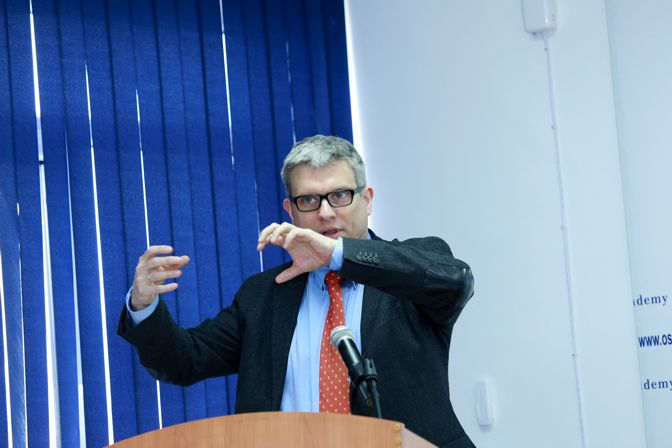News
Public Lecture on the Trials of the Islamic Revival Party
On 25 March the OSCE Academy held a public lecture "Between a rock and a hard place - the Islamic Revival Party of Tajikistan and the (Re-)negotiation of Islam in contemporary Tajikistan" by Dr Tim Epkenhans.
The presentation discussed the trials and tribulations of the Islamic Revival Party of Tajikistan (IRPT) in the context of Tajikistan's contemporary history with a particular focus on the religious agenda of the party and its relations to the wider religious field in Tajikistan.
In his speech, Dr Epkenhans touched a historical component of the Islamic Revival Party of Tajikistan, its appearance and outlined the Soviet and post-Soviet stages of evolution.
Speaking about the Soviet time, Dr Epkenhans stressed that political Islam in the 20th century originated mainly on the basis of domestic and clandestine practices. IRPT founder Said Abdullah Nuri was an active supporter of the establishment of an Islamic state in Tajikistan. He openly expressed his views in the face of fierce atheist power radicalism. Nuri and supporters of the party had two main objectives: to promote the ideas of pure Islam, and the education of people in a religious spirit. Such attempts often severely disrupted supporters and Nuri himself repeatedly served time in prison.
The party was officially recognized only in 1991, when the second stage of formation and development of political Islam in Tajikistan started.
Speaking on the activities of the IRPT since the signing of the General Peace Accord which had ended the country's Civil War in 1997, Dr Epkenhans stressed that the Party has distinguished itself as a credible oppositional political party committed to democratic values and principles with an almost imperceptible religious agenda. By shifting the IRPT's attention to issues of democratization and social-economic development, its current Chairman, Muhiddin Kabiri opened the IRPT to a younger and urban electorate.
However, in recent years the IRPT has been accused of an excessive caution in relations with the authorities. Some people believe that the IRPT complied with Emomali Rahmon’s political game rules and is not going to change tactics. Dr Epkenhans stressed that the situation is complicated by the presence of other secular and pro-Western political parties, that have appeared and have been operating in the country in recent years.
However, speaking about the results of the parliamentary elections on 1 March 2015 and the exclusion of the Islamic Revival Party of Tajikistan from Tajikistan's Lower House, Dr Epkenhans summarized, that the party’s defeat in the ‘elections’ mark a caesure for post-conflict Tajikistan.
The question and answer session touched upon Tajik state ideology, students were able to learn more about Iran's influence on the Islamization of Tajikistan, as well as discuss the future of the IRPT.



 Русская версия
Русская версия